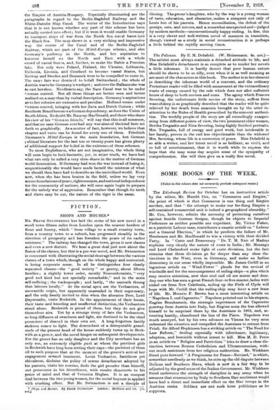SOME BOOKS OF THE WEEK.
[Notice in this column does not necessarily preclude subsequent review.] The Edinburgh Review for October has an instructive article by the editor, Mr. Harold Cox, on " Commerce and Empiie," the point of which is that Commerce is one thing and Empire another, and that " the attempt to make our far-flung Empire a self-contained commercial unit is indeed a geographical absurdity." Mr. Cox, however, admits the necessity of protecting ourselves against hostile German designs, though he objects to Imperial Preference as neither possible nor expedient. Mr. Victor Fisher, as a patriotic Labour man, contributes a caustic article on " Labour and a General Election," in which he predicts the failure of Mr. Henderson and Mr. MacDonald to win a victory with their divided Party. In " Caste and Democracy " Dr. T. M. Nair of Madras explains very clearly the nature of caste in India ; Mr. Montagu and Lord Chelmsford make light of caste divisions, but the fact remains that these divisions go far deeper than any class dis- tinctions in the West, even in Germany, and make an Indian democracy in our sense wholly impossible. Mr. James Carlill in an ingenious article on " Wind-Power " pleads for the revival of windmills And for the encouragement of sailing-ships—a plea which may receive attention, now that coal and oil are scarce and dear. Any one who has seen a great French four- or five-master, laden with nickel ore from New Caledonia, sailing up the Firth of Clyde will hope with Mr. Carlill that the sailing-ship may have a new lease of life. Mr. Horatio F. Brown has a most interesting article on " Napoleon I. and Caporetto." Napoleon pointed out to hie stepson, Eugene Beauharnais, the strategic importance of the Caporetto gateway from Austria into Italy, but Eugene none the less allowed himself to be surprised there by the Austrians in 1803, and, re- treating hastily, abandoned the line of the Piave. Napoleon was much annoyed, but by his own advance on Vienna he very soon redeemed the situation and compelled the Austrians to retreat from Friuli. Sir Alfred Hopkinson has a striking article on " The Need for - Law Reform," dealing especially with inheritance, legitimacy, adoption, and homicide without intent to kill. Miss M. D. Petre in an article on " Religion and Patriotism " tries to draw a clear dis- tinction between Roman Catholicism and Ultramontarrism, with- out much assistance from her religious authorities. Mr. Wickham Steed puts forward "A Programme for Peaces–Revised," in which, somewhat needlessly as we think, he stirs up the old dispute between Italians and Southern Slays, which is now in a fair way to be adjusted by the good sense of the Italian Government. Mr. Wickham Steed underrates the strength of discipline in any army when he assumes that concessions by Italy to Southern Slav sentiment would have had a direct and immediate effect on the Slav troops in the Austrian ranks. Soldiers are not such keen politicians as he supposes.


































 Previous page
Previous page